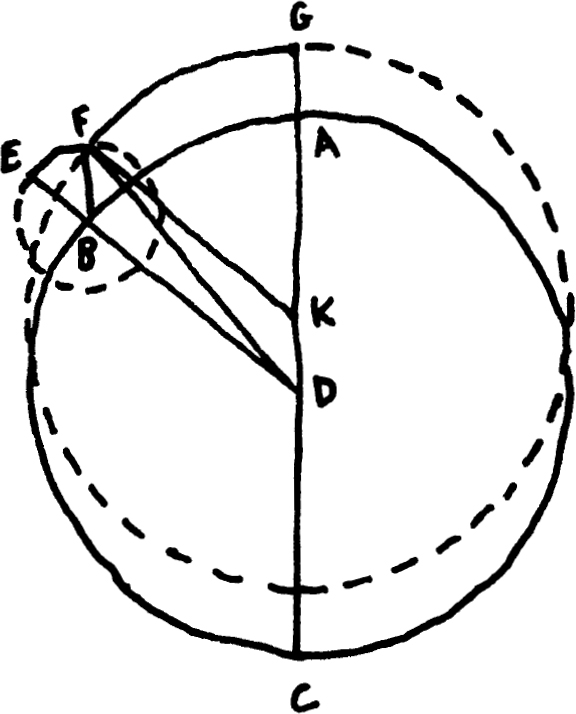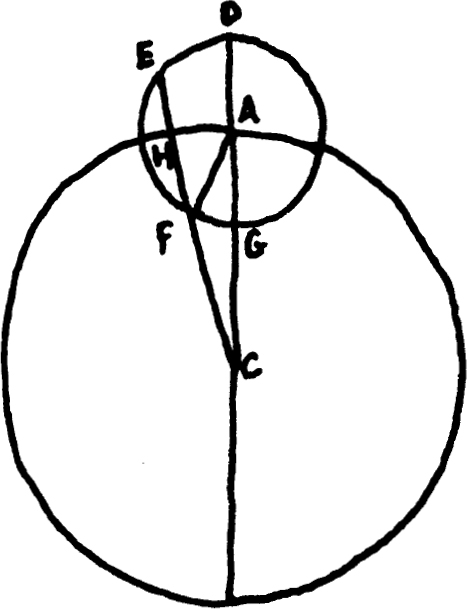
AMAURY RETURNED to the palace by a side door, shaking from the chill of his wet clothing. He warmed himself by a fire in the entrance hall and considered what Rabelais had said. More, actually, he considered what Rabelais was. Not a buffoon at all. Rather, a man utterly comfortable with his existence. A man who followed his own road, regardless of the opinion, lack of approbation, or even the jeers of others. A man who felt God but rejected the Church’s definition of Him. A man with many questions, perhaps, but without doubts. A man to be envied. Perhaps emulated.
After the fire had done its work, Amaury located an alcove in a quiet hall. He sat on the stone seat, gazing for a moment at the rivulets of rain snaking their way down the outside of the small, stained-glass window set high in the alcove’s wall. The window had a rose in the center. The movement of the water created the sensation of a flower shimmering in the wind. He leaned out into the hall to ensure that he was alone, then removed the folded paper from his pocket and once more studied the riddle Giles had penned.

The material in Castell’buono’s room was mathematical, Père Louis-Paul had said. Scientific. Amaury had no doubt that it related in some fashion to this diagram. But the diagram was incorrect. Or seemed to be. It contained the extra layer of data he had mentioned to Vivienne. Amaury was as familiar with the concept as he was with the snows of Savoy. He traced his finger over the diagram as it should have been drawn. In his mind’s eye, he saw:

Here was Ptolemy’s illustration of an epicycle, the one he had drawn in the dirt for Vivienne. C, to Ptolemy, would be the Earth, stationary at the center of the universe. A was a point on the orbit of a body, Mars, perhaps. Mars rode on the smaller orbit around point A. Thus, during half of its orbit around A, Mars would appear to someone on Earth at point C to be moving backward. But in Giles’ diagram, there seemed to be two centers, K and D.
Why the change? Who would question one of the most fundamental and universally accepted precepts of science? And what could this alteration have to do with a reinterpretation of Genesis?
“Monsieur Castell’buono is in the courtyard. He wishes a word.”
Amaury jerked his head up, hurriedly folding the paper. Philippe Sévrier was standing over him. Amaury had neither seen nor heard him approach.
“Of course. Could you give me a moment, please?” Had Sévrier seen the paper? How had Sévrier even known where he was?
Sévrier nodded and withdrew. Soon after, Amaury composed himself and made his way outside. The fine rain continued to fall and Amaury was again chilled as soon as the mist settled into his doublet. How spoiled he’d become. At Montaigu, he never would have noticed such a minor inconvenience as cold.
Castell’buono was near the gate, seated astride a large bay, saddle and bunting emblazoned with the crest of Navarre. Two of the queen’s soldiers were mounted behind him. Sévrier stood at his side, listening as the Italian leaned over slightly to impart instructions. When Castell’buono observed Amaury’s approach, he spoke more quickly, glancing up occasionally to ensure that he finished what he wanted to say before Amaury was in earshot. He straightened himself in the saddle as Amaury arrived.
“You wished to see me?” Amaury asked.
“To say à bientôt. It seems I am to travel to Angoulême for Her Majesty on a matter that cannot wait.” Castell’buono’s grin was absent.
“A testament to the esteem in which you are held by the queen,” Amaury replied.
“No doubt. I am flattered at the attention. Will you be here when I return, or do you intend to leave to reclaim the joys of Paris?”
“I had thought to journey north, but I believe I will remain here for a time. I am drawn to the vibrancy of Queen Marguerite’s court.”
“Yes,” Castell’buono acknowledged. He glanced upward, toward the apartments on the second floor. “I’ve noticed. In any event, I hope you do remain. In the interim, Philippe can continue to see to your needs.” Castell’buono made to begin his ride, then stopped. “Oh, yes. One last thing. I saw you speaking with that priest. Take care. I have suspicions that he serves a master other than God. Or Queen Marguerite.”
“Thank you for the warning. Bon voyage then.”
Castell’buono nodded. “Yes.” He snapped the reins and Amaury watched as horse, rider, and the two soldiers moved through the open gate. After the Italian had departed, Amaury turned and observed Philippe Sévrier staring at him, even and unblinking. As Amaury walked across the courtyard toward the palace, he felt Sévrier’s eyes like two fingers pressing into his back.
He was going to need help. That was certain. After a number of inquiries, Amaury finally located Vivienne in the chapel. She was knelt in prayer, four rows from the rear.
Amaury scanned the interior for Père Louis-Paul, but the priest was not present. Neither had Sévrier appeared. Amaury moved into the row behind Vivienne so that she might complete her prayers without interruption. Almost immediately, however, she turned and saw him. For an instant she seemed startled.
“Might I speak with you when you are done?” Amaury whispered.
“I’ve finished,” Vivienne said softly. She rose slowly and moved to the aisle, then knelt once more to make the sign of the cross.
Amaury had intended to speak with her outside, in some corner of the courtyard, where prying ears could not reach, but the rain continued to fall. Instead he led her to an alcove at the far end of the nave.
“Vivienne, I have an apology and a request.” He spoke softly, just over a whisper.
“An apology, Amaury?” she asked, matching his tone. “What do you have to apologize for?”
“I have deceived you.”
“No. The instant I saw the way the two of you looked at each other, I knew. You haven’t deceived me.”
Amaury had been prepared for any number of responses, but not that one. “But that was long—”
“Its all right. I know you have feelings for me, just not the same feelings you have for her. At one point, I admit I did think what it might be like . . . with you. Traveling as husband and wife as we were.”
“So did I.”
She touched his hand. “But this way is better for both of us. I’m certain.”
“Is that why you have been so . . . friendly . . . with Castell’buono?”
She laughed, clear and girlish.
“Castell’buono is amusing, surely, but I have no affection for him. I was afraid, Amaury. I am still afraid. How do you think I felt, walking into the palace with a woman of noble birth? Your childhood love? Castell’buono wanted me from the first—I have sufficient experience in that regard to know—and was willing to guide me through this torture. When I realized you were not, I accepted his attentions.”
Amaury felt like a cad, even worse for what he was about to ask. “I’m sorry, Vivienne. Truly. But when I said I had deceived you, I wasn’t talking about . . . Hélène. I meant that I have not told you the truth about my mission here.”
She waited.
“I was asked by Monsieur Hoess not only to deliver correspondence but also to observe the Italian. There is little question that a spy has been placed among the Lutherans. Routbourg’s murder attests to that. Castell’buono’s absence at the meeting at which Calvin spoke convinced Hoess that he may well be the traitor.”
Vivienne looked stunned. “Castell’buono. I would not have guessed. But I suppose his absence at La Croix Faubin was suspicious.”
“Yes. Hoess felt certain that, if Castell’buono was the spy, proof could be found in his rooms. I refused to take on the task, but during our journey here I have become more committed to your cause. If Castell’buono does have incriminating material in his rooms, I think we should find it before other lives are lost.”
“We?”
“Yes, Vivienne, that is my request. I need your assistance.”
She agreed instantly. “Of course, Amaury. Anything.”
Her acquiescence and trust made Amaury feel even worse for the lie. But he was determined to see the materials in the Italian’s room. Not to satisfy his commitment to Ory and the Inquisition. In fact, he now had little intention of telling the priest what he discovered. Castell’buono had been correct. He made a terrible spy. He sought truth not for his employer but for himself.
“I need you to distract Castell’buono’s man, Philippe, so I may enter the room unobserved,” Amaury said.
“Not difficult.” She smiled wryly. “This is a task for which I am well suited.”
Amaury was relieved when she did not think to ask how he intended to gain entry to a room that would undoubtedly be locked. “But you must take great care, Vivienne,” he added. “Please, do not be overconfident. This Philippe is dangerous.” Amaury began to say, “He murdered Giles,” but stopped when he realized he was not willing to explain how he had come by the knowledge. Instead he said, “One need only to look at him to know that.”
“He is a man, is he not?” Vivienne replied.
“I’m not certain what he is. But in any case, you will need to be very much on your guard. Keep him in a public place.”
“Just tell me when you wish his absence. I’ll do the rest.”
“I am worried for you, Vivienne. If anything should happen—”
She turned suddenly serious. “What, Amaury? What are you trying to say?
“I would not forgive myself,” he replied, his voice trailing off.
A cloud appeared on her face, then passed just as quickly. “I will be quite safe.”